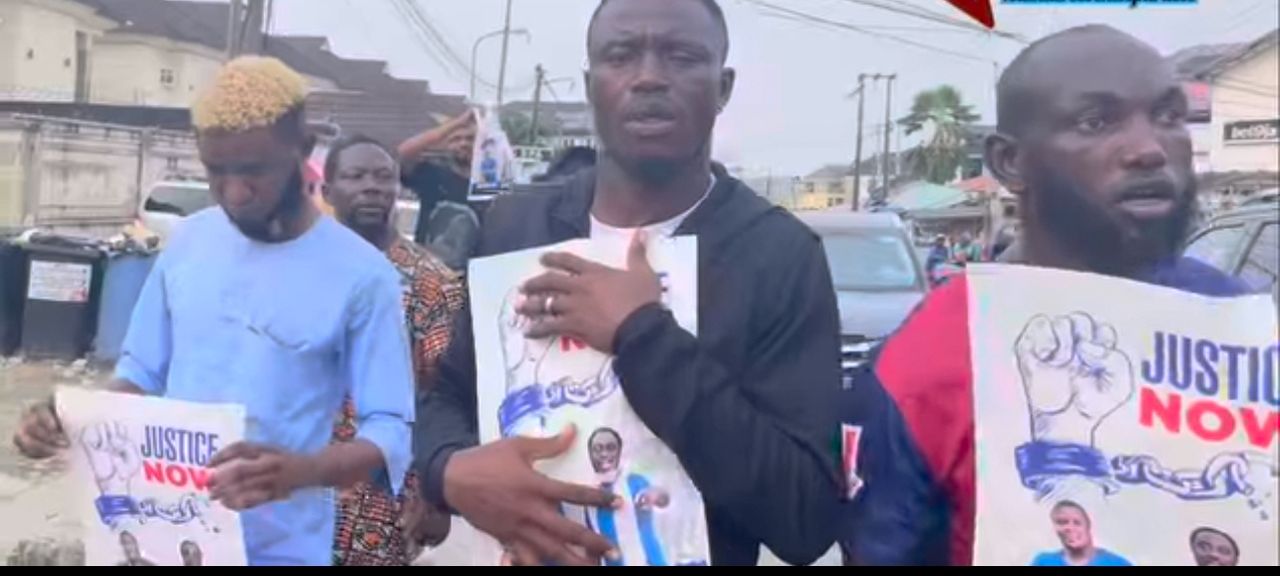society
Corruption: The Paradox of George Orwell’s Animal Farm in Nigeria

“All animals are equal, but some animals are more equal than others”
A proclamation by the pigs that control the government in the novel Animal Farm, by George Orwell has reared its ugly head. The sentence is a comment on the hypocrisy of governments that proclaim the absolute equality of their citizens, but give power and privileges to a small elite. This nauseating development has come to fruition in one of the most discussed issues in our dear nation Nigeria where the Kano State High Court has ruled that the trial of the Chairman of the All Progressive Congress (APC), Abdullahi Ganduje, and others accused of bribery and misappropriation will continue even in their absence.
The Kano State Government, on Thursday, arraigned immediate-past governor Abdullahi Ganduje, his wife, Hafsat, son, Umar and six others for alleged $413,000 and N1.38bn bribery. The defendants, who were absent from court, were arraigned in absentia.
The Governor Abba Yusuf-led government had since April filed the charges against Ganduje and others, but efforts to serve them the charges had proved abortive. At the previous hearing on June 5, the prosecution obtained an order to serve the charges on them by substituted means, through newspaper publication.
The Kano State Government assembled 15 witnesses to testify against the defendants, immediate-past governor, Abdullahi Ganduje, his wife Hafsat Umar; Abubakar Bawuro; Umar Abdullahi Umar; Jibrilla Muhammad, Lamash Properties Limited, Safari Textiles Limited, and Lasage General Enterprises Limited to face eight counts of alleged bribery, diversion, and misappropriation of funds amounting to billions of naira. During the last hearing on April 29, 2024, the court was set to rule on a motion for substituted service, but the defendants had not yet been served.
The charges span a series of alleged corrupt activities. Ganduje was accused of receiving $200,000 from a contractor in exchange for government contracts between January 2016 and February 2017. The second charge claims he collected an additional $213,000 as a kickback from the Kantin Kwari textile market-remodelling project.
Ruling days back, Justice Amina Adamu-Aliyu dismissed the state government’s application for a bench warrant against the defendants.
“The trial of the defendants continues even in their absence,” she stated.
It is imperative to provide jurisprudential insights herein, as the court had previously, on June 5, granted an order to serve Ganduje and the other defendants through substituted service.
The prosecution counsel, Adeola Adedipe (SAN) informed the court that the defendants had been served, and an affidavit of service was filed on June 6.
He noted, “My lord, the 1st, 2nd, 3rd, 4th, 5th, 7th, and 8th respondents are not in court nor represented, only the 6th respondent”.
Adedipe requested the court to enter a plea of not guilty on behalf of the absent defendants, citing section 278(1)(2) of the Kano State Administration of Criminal Justice Law (ACJL) 2019.
“The court should enter a plea of not guilty on behalf of the defendants who refused to answer the complaint in the charge,” Adedipe argued.
He also urged the court to issue a bench warrant of arrest pursuant to Section 388 of the Kano State ACJL, stressing, “The essence of an arrest warrant is for the sanctity and urgency of the court because an order has been made for the defendants to appear before it and they refused”.
However, counsel for the 6th respondent, Nureini Jimoh (SAN) contended that service had not been properly affected on his client.
“We filed a notice of preliminary objection on the competency of the entire charge. The court does not have constitutional power on any of the count charges,” Jimoh stated.
He also mentioned that an application for a stay of execution had been filed before the Court of Appeal, “restraining the prosecution from publishing any charges against the 6th respondent”.
Jimoh urged the court to dismiss the prosecution’s application for a warrant of arrest and to refrain from entering a plea of not guilty on behalf of the 6th respondent.
Justice Adamu-Aliyu has adjourned the case until October 23 and 24 for the hearing of the preliminary objection and the main charge.
This development portends grave danger in the scheme of affairs with questions begging for an answer that is the ruling party helmsman immune to scrutiny and forensic investigations by the anti-corruption body, EFCC? In hindsight, Governor Abba Kabir Yusuf pontificated in public domain that his predecessor, Ganduje has a case to answer as his government will stop at nothing to bring him and his co-travellers to book over his eight-year’s tenure characterized by corruption.
It’s beyond beggar’s belief that such an infringement has been swept under the carpet, as a similar case that involves the immediate-past Kogi State governor; Yahaya Bello is hugging the headlines indefinitely. The confluence sub national entity stated earlier in public domain that GYB has no case to answer, but the EFCC states that reverse is the case.
The Governor in his reaction regretted that Ganduje who was supposed to cover his face in shame over cases of corruption and political violence hanging around his neck shamelessly spoke about non-existent failure in the New Nigeria Peoples Party (NNPP) led government in the state.
According to the statement, “Governor Yusuf insisted that Ganduje presided over two unproductive tenures characterised with, inability to cater for the needs of Kano’s population and nepotism.
“Our eight months in office has remarkably outweighed Ganduje’s eight wasted years of political caricature and maladministration by all standards,” Governor Yusuf stated.
He advised the acting National Chairman of All Progressives Congress (APC) and the immediate-past Governor of the state, Abdullah Umar Ganduje to rather buckle up in defence of his battered image at the court, instead of further exposing his impunity on the media space.
Furthermore, to gain helicopter oversight on this thorny issue that’s a sore thumb that constitutes leprous fingers was highlighted by Muhuyi Magaji, chairman of the Kano state Public Complaints and Anti-Corruption Commission (PCCAC), where he stated inter alia that the agency has traced N51.3 billion allegedly diverted by Abdullahi Ganduje, former governor of the state.
Magaji spoke during an interview on Arise TV. He said the funds traced by the anti-corruption commission were half of the over N100 billion meant for LGs in the state.
“The monies were channeled to different local government accounts. They then met with local government staff to create false expenditure with a payment voucher and then diverted the money through a third party,” he said.
“We traced a lot of the diverted funds to various individual accounts at the single market and subsequently took the money in cash to the state government house with someone stationed with a counting machine.”
The trajectory where ignominious allegations that involve perceived associates of the ruling party and levers of power are overlooked, while entities in the bad books of the system are subjected to vice like grip treatment leaves a sour taste in the mouth that could be equated to dystopian locomotion in a democracy.
Ayoola Ajanaku is a Communications and Advocacy Specialist based in Lagos, Nigeria….
society
Ajiran Youth Protest Over Deaths of Two Residents, Demand Justice

Ajiran Youth Protest Over Deaths of Two Residents, Demand Justice
The Ajiran community of Lagos State erupted in a powerful protest on Tuesday as local youths took to the streets to express their grief and anger over the tragic murders of Prince Ademola Akintoye and Sherrif Agboworin. The demonstration follows the recent decision to reopen the murder case, an investigation that has already led to the arrest of over nine suspects in connection with the heinous crimes committed more than a year ago.
Carrying vibrant banners and poignant posters featuring the faces of the deceased, the protesters marched through the heart of their community while singing somber dirges to honor their memory. With chants of unity and justice ringing in the air, they called on both the Lagos State Government and the Lagos State Police Command to ensure that those responsible are swiftly and decisively brought to justice.
The youth leaders emphasized that peace and normalcy will remain elusive in Ajiran until all those complicit in the killings are held accountable. They articulated that true justice is the only way to restore tranquility and honor the lives of Akintoye and Agboworin, whom they described as innocent victims of a grave injustice.
Speaking on behalf of the demonstrators, youth leader Mr. Kehinde Oladele urged law enforcement to conduct a thorough and fair investigation. He asserted that every individual involved including the nine arrested suspects must face the full extent of the law. Especially Hammed Tajudeen, the principal suspect mentioned by others in custody, whom they believe should not escape scrutiny.
“The reopening of this case after more than a year is a critical first step towards achieving justice and fairness for our brothers,” Oladele said. “We urge the police to get to the root of the matter. Those mentioned during the investigation, especially Hammed Tajudeen, should not be spared.”
The atmosphere in the community grew increasingly tense last week following speculation that prominent businessman Aare Bashir Olawale Fakorede was implicated in the unrest. The speculation appeared to stem from his alleged influence on the reopening of the murder investigation. This misunderstanding escalated when a group of protesters targeted his filling station in Ikate, vandalizing his properties and disrupting business operations in the gas station based on the false assumption that Fakorede was behind the police’s renewed inquiries.
In response to the rising tensions and misinformation, Fakorede’s spokesperson, Ola Muhammed, issued a comprehensive statement denying any connection between Fakorede and the unrest. The spokesperson emphasized that rumors suggesting the businessman orchestrated the revival of the murder case were completely unfounded.
“I feel it is crucial to clarify, for the sake of transparency and historical accuracy, that this entire ordeal is in no way related to me,” Fakorede stated. “I am also very interested to see that the culprits are brought to book. I categorically affirm that I have never been involved in any business dealings with Mr. Hammed Tajudeen.”
Fakorede further elaborated that the recent protests which led to the destruction of his property were reportedly instigated by Tajudeen and others who seem determined to manipulate the narrative and cast suspicion upon him. Fakorede expressed his own strong commitment to uncovering the truth surrounding the deaths.
As the police investigation progresses, it has become increasingly apparent that all accusing fingers are pointing to Hammed Tajudeen who is currently evading capture, adding another layer of complexity and urgency to the ongoing situation. Community members have questioned why he remains at large instead of submitting himself to the police for questioning if he is truly innocent of the allegations against him.
Community leaders are now emphasizing the need for dialogue to address the root causes of the unrest and work toward restoring harmony within Ajiran, even as the demand for justice remains at the forefront of public consciousness.
society
Ramadan: Al-Yusuff International Travels and Tours Boss Greets Muslims

Ramadan: Al-Yusuff International Travels and Tours Boss Greets Muslims
As the holy month of Ramadan begins across the globe, the Chief Executive Officer of Al-Yusuff International Travels and Tours Limited, Dr. Abdulmajeed Oladele, has extended his heartfelt greetings to Muslims worldwide.
In his message, the respected business mogul expressed gratitude to Almighty Allah for the privilege of witnessing this year’s sacred month.
“We glorify Allah for granting us the grace and opportunity to witness this year’s month of blessings. Ramadan is a sacred and special month for all Muslims, a month greater than many others, filled with piety, mercy, and abundant blessings.
I congratulate all Muslims across the world. Let us faithfully observe the requirements of Ramadan. May Allah (SWT) grant our heart’s desires and make this period easy and rewarding for us all.”
Dr. Oladele urged Muslims to embrace the spiritual significance of Ramadan through devotion, charity, self-discipline, and prayers for peace and prosperity.
society
UKA UNVEILS THREE-TIER ATC PLATFORM AS MONARCH ANNOUNCES $10BN GOLD-BACKED MILESTONE

UKA UNVEILS THREE-TIER ATC PLATFORM AS MONARCH ANNOUNCES $10BN GOLD-BACKED MILESTONE
Emperor Nobilis Prof Solomon Winning declares global recognition of ATC ecosystem, urges citizens and partners to embrace unified digital, crypto and gold-backed financial structure
The Reigning Monarch of the United Kingdom of Atlantis (UKA), Emperor Nobilis Prof Solomon Winning, has formally announced what he described as a historic milestone in the financial evolution of the Atlantis nation and empire worldwide, the consolidation and global recognition of the ATC financial ecosystem backed by a $10 billion gold reserve.
In a voice message released from the Office of the Throne, the Monarch expressed gratitude to God and to citizens and partners across the globe for what he termed a “defining achievement” in the journey of the United Kingdom of Atlantis.
According to him, the ATC asset structure, supported by a $10 billion gold-backed certificate, has now been positioned among the world’s leading capitalisation financial platforms, ranking number 12 globally.
“We appreciate God for the milestone achieved of our 10 billion gold-backed certificate of ATC assets. We are delighted to inform our esteemed citizens, partners, viewers and friends all over the world that ATC has come to stay,” the Monarch declared.
Three Distinct but Interconnected ATC Platforms
Emperor Winning explained that the UKA Government and the Atlantis nation have officially released three integrated ATC platforms to the general public. He emphasised that while each platform serves a distinct purpose, they are structured to interact seamlessly for effective management, business transactions and global trading operations.
1.ATC Digital (Government Platform)
The first platform, known as ATC Digital, is the official government-backed digital transaction system. It is designed to facilitate digital financial operations within the UKA ecosystem and serve as the administrative and transactional backbone of the nation’s digital economy.
The Monarch described it as the formally recognised digital framework governed directly by the government under the Throne.
ATC Gold Version (Business and Trade Platform). The second platform, referred to as the ATC Gold Version, is primarily tailored for business trade, commercial exchange and transactional fluidity. It is structured to enhance business-to-business engagement, exchangeability and broader economic interaction.
“This version is mainly for business trade, business exchange and commercial transactions,” he clarified.
ATC Crown Coin (Crypto and Visitor Platform)
The third platform, known as the ATC Crown Coin, represents the Atlantis Crown Coin and is linked to what the monarch described as the Atlantean Bank Gold structure. This version operates as a crypto and digital hybrid, including visitor engagement capabilities and broader exchange functions.
(atlantisgoldbank.org
The Digital/Cryto currency Version
Atlantian Crown Gold (E-ATC) https://share.google/a7Jns9VtrMKCZ6Prk
The E-ATC purely for Trading and Exchang
Atlantean Crown (ATC) – The Future of Digital Currency https://share.google/1EhdkkDBFvBLLgfR1
The Digital version for Government
We also Have DEOS INTERNATIONAL Bank (DIB)
And ATCB)
The Monarch indicated that all three platforms are interconnected to ensure efficiency, transparency and global recognition.
“Please do not be confused. The United Kingdom of Atlantis has three major versions of ATC. Two are crypto-based, one is digital; one is also a hybrid of crypto and digital. All three interact together for effective management and effective business transactions.”
Global Recognition and Expansion Vision
Emperor Winning further asserted that the ATC ecosystem is already recognised internationally and positioned within the global financial framework. “Our platforms are presently recognised in the whole world,” he said, while encouraging existing holders of ATC assets to remain confident in the system.
He congratulated all ATC holders and reiterated the Throne’s commitment to strengthening the ecosystem’s credibility, usability and cross-platform functionality.
A Strategic Financial Architecture
Observers say the three-tier structure reflects an attempt by the United Kingdom of Atlantis to create a multi-layered financial architecture combining government-regulated digital systems, crypto-based trade platforms and gold-backed reserve credibility.
By integrating digital governance with cryptocurrency and gold certification, the UKA appears to be positioning ATC as both a sovereign-backed asset and a tradable global instrument.
As the UKA advances its financial ambitions, the monarch’s message signals a push for adoption, participation and global engagement with the ATC ecosystem.
“If you are a holder of ATC, congratulations to you from the Throne. God bless you,” the monarch concluded.
The development marks another significant chapter in the evolving digital and gold-backed finance narrative emerging from the United Kingdom of Atlantis.
-

 celebrity radar - gossips6 months ago
celebrity radar - gossips6 months agoWhy Babangida’s Hilltop Home Became Nigeria’s Political “Mecca”
-

 society6 months ago
society6 months agoPower is a Loan, Not a Possession: The Sacred Duty of Planting People
-

 news6 months ago
news6 months agoTHE APPOINTMENT OF WASIU AYINDE BY THE FEDERAL GOVERNMENT AS AN AMBASSADOR SOUNDS EMBARRASSING
-

 society5 months ago
society5 months agoReligion: Africa’s Oldest Weapon of Enslavement and the Forgotten Truth









